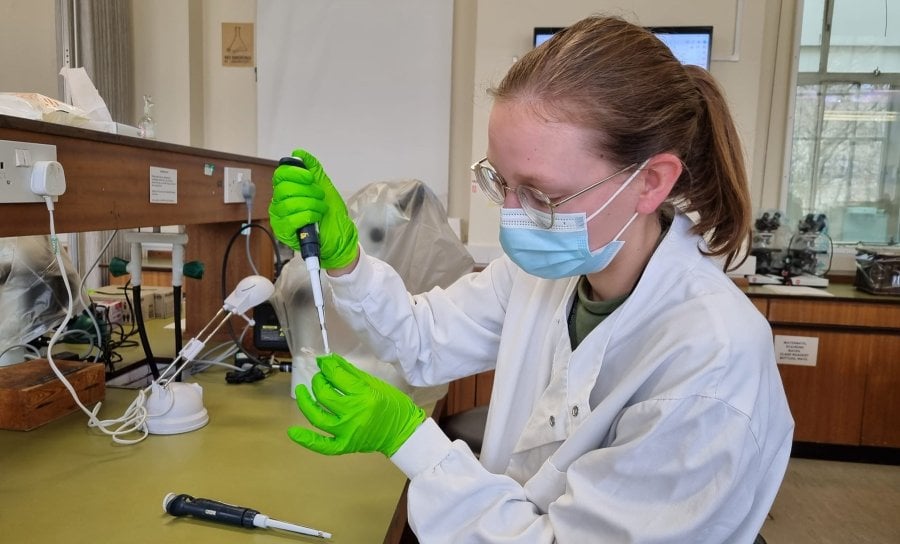Studying Medical Parasitology - Bronwyn's story
1 June 2022 London School of Hygiene & Tropical Medicine London School of Hygiene & Tropical Medicine https://lshtm.ac.uk/themes/custom/lshtm/images/lshtm-logo-black.png
Please tell us about your academic/professional background
I graduated with a BSc in Global Resource Systems (Global Health specialisation) from the University of British Columbia in 2021. This program was highly interdisciplinary, allowing me to take courses in public health, microbiology, nutrition, and sustainability. During my undergraduate degree, I held research assistant positions in agricultural sciences and nutrition, and worked in contact tracing and a vaccination clinic during the COVID-19 pandemic. After finishing my undergraduate degree I began working as a research assistant for the Institute for Global Public Health at the University of Manitoba, and have maintained this position part-time alongside my studies at LSHTM.
Why did you chose to become a medical parasitologist?
I chose the Medical Parasitology programme at LSHTM after attending their Open Day in 2020 – I actually went in leaning towards a completely different programme, but after undertaking a lab tour and speaking to alumni I was confident this was the right programme for me. Parasitology was a discipline that was completely new to me, and I knew in this programme I would have the opportunity to learn a completely new skillset and gain knowledge in a relatively ‘niche’ area. I was also drawn to the emphasis on practical teaching and development of laboratory skills. In the second term, students can take modules of their choosing, and I have thoroughly enjoyed learning about concepts and gaining skills in infectious disease research beyond solely parasitology.
How did you find the mix of online and in-person teaching?
I think we’ve been quite lucky in parasitology to have a significant amount of time in the lab throughout the year, which means we were fortunate enough to be able to come into the building and still complete our lab practicals in person at the beginning of the year while other courses were still online. Even with classes being in-person now, I do appreciate the ability to still have online lectures at times at it allows for increased diversity of speakers and the opportunity to hear from researchers working directly in the field. Personally, I think the best lectures I’ve had this year have been online lectures from researchers based in endemic areas.
My experience at LSHTM has completely changed my perspective on research and what I want my future career to look like
What key skills are you gaining from studying this programme?
One of the key skills I have gained this year is definitely laboratory skills – I have had the opportunity to take modules in molecular biology as well as diagnostic parasitology, which has allowed me to develop a variety of lab-based skills. Recently, the Medical Parasitology and Medical Entomology courses embarked on a week-long field trip at the Slapton Ley Field Centre, which was an aspect of the programme we were fortunate to be able to have in-person as it has been cancelled due to the pandemic the past few years. This allowed us to gain experience in a field setting – working with limited supplies, long hours (often 15 hour days!) and learning new techniques. This trip provided us with the opportunity to gain more hands-on experience and put our learning into practice by performing fish dissections, collecting samples directly from livestock, and use our own real-life data in our analyses.
What have you got planned for your summer project?
For my summer project, I will be investigating co-infection of female genital schistosomiasis (FGS) and sexually transmitted infections (STIs) in Zambian women. I’m particularly interested in the relationship between infection intensity and presence of STIs. I’ll be based at Zambart (University of Zambia) in Lusaka, Zambia and will use molecular techniques to determine the prevalence of FGS and examine infection intensity, and then will utilise statistical techniques to investigate any associations with STIs. I’m extremely excited about this project as it allows me to combine my interests in parasitology and sexual and reproductive health, and engage in interdisciplinary research using methods from different disciplines.
What advice would you give to someone considering studying your course at LSHTM?
I would say to take advantage of all the incredible opportunities you have access to as a student during your time here – don’t be afraid to approach researchers with your own ideas for summer projects, utilise the careers service, and attend talks and events that interest you! For the Medical Parasitology programme specifically, I would recommend tailoring your modules to your interests, as even if some are outside the scope of the programme, you can get permission to take modules outside of the core options and personalise your experience.
Please sum up your experience of studying at LSHTM
I would say overall my experience at LSHTM has completely changed my perspective on research and what I want my future career to look like – it has exposed me to new disciplines and methods, and has allowed me to pursue the topics I am most interested in through undertaking my own project. I have greatly appreciated the dedication of the lecturers and staff to our learning as students, in particular the lab teaching staff have been incredible.
I’ve also really enjoyed my activities outside of the classroom like being a student ambassador and a student rep for STIRIG (Sexually Transmitted Infections Research Interest Group). I definitely feel more equipped for my future career and have a much clearer picture of the kind of research I hope to engage in.
- Contact Bronwyn.
- Explore funding and scholarship opportunities.
- Discover the MSc Medical Parasitology.